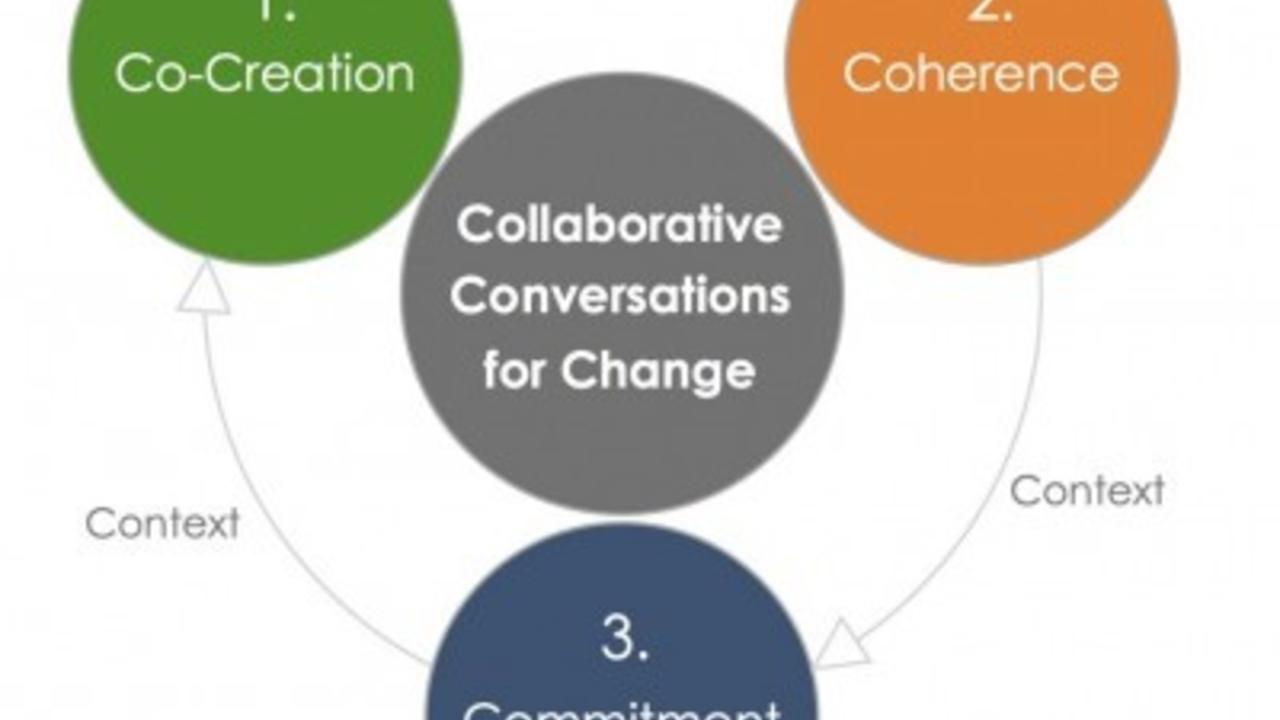
The conversations a social system has about itself – who it is, what it has, and what it wants for itself into the future – will impact its current level of viability determine its future potential. Collaborative Conversations involve the intentional use of conversation as a core process for cultivating the collective intelligence of a social system in order to create business and social value. Collaborative conversations are a foundational process for The Holos Group‘s work of enabling and implementing change successfully in a range of business and social contexts. Â In using collaborative conversations, we aim to create generative meaning for groups in service of cultivating shared purpose and wise action.
I was first introduced to the power of using collaborative conversations (‘generative dialogue’) as a central meaning-making process for social systems through my training in the practices and processes of the Art Of Hosting. And the brilliant work of Otto Scharmer and the generative dialoguing processes that underpin Theory U continue to inform my work guiding groups through wisdom creation to purposeful action for change. Alan Webber (author and HBR columnist) proposes:
Conversations are the way workers discover what they know, share it with their colleagues, and in the process create new knowledge for the organisation. In the new economy, conversations are the most important form of work … so much so that the conversation is the organisation.”
Each time I and The Holos Group are invited to convene a conversations for change we find evidence supporting the truth of Webber’s premise, “... in the new economy, conversations are the most important work … the conversation IS the organisation.”
Underpinning our work with Collaborative Conversations For Change are three inter-related elements.

Each of these elements work to create, evolve and reinforce the context for change (i.e., The underlying reason informing why an individual, organisation or community needs to change) and continue to maintain the change container as the process of transformation unfolds.
In summary, the three lenses of focus in cultivating and curating collaborative conversations for change are:
Co-Creation
Principle: A system that co-creates its own solutions to shared challenges is more likely to thrive. Co-creation results in the generation of more comprehensive and integrated solutions, and also fast tracks the group's understanding and buy-in to those identified solutions.
Coherence
Principle: The more effectively a system is able to cultivate shared meaning of the reason for change (and the journey through it) the more flow or energy is exchanged between between elements of the system during the change process, and the more the system is able to operate as 'one mind' in changing.
Commitment
Principle: A system's capacity to change is impacted by the number of distractions on its focus whilst changing. To successfully implement any change, the system the involved in change process needs to fully commit to the new future reality being created and let go of aspects of the present reality that no longer serve that future.
As the cliche states: Change is the only constant. Organisations that do not learn at a rate faster than the rate of change will perish. An organisation’s culture needs to be one of learning agility and change fitness and Collaborative Conversations For Change enable an organisation (and its people) to improve its learning agility and change fitness.
Further, the quicker an organisation’s people are able to cycle through the three underpinning tenets of collaborative conversations – co-creation, coherence and commitment – for any given change context the more likely that organisation is to identify, implement and integrate the required change initiative at a speed quicker than the global business eco-system demands.




